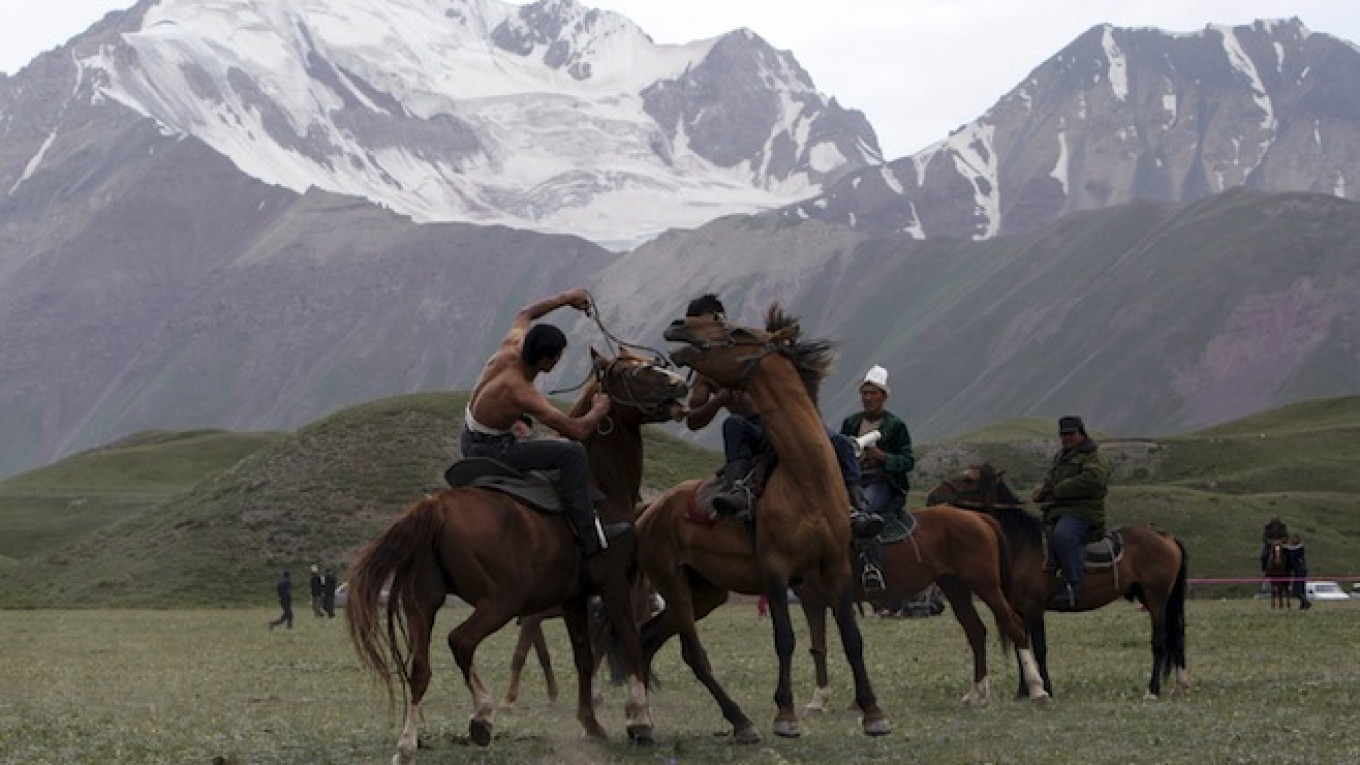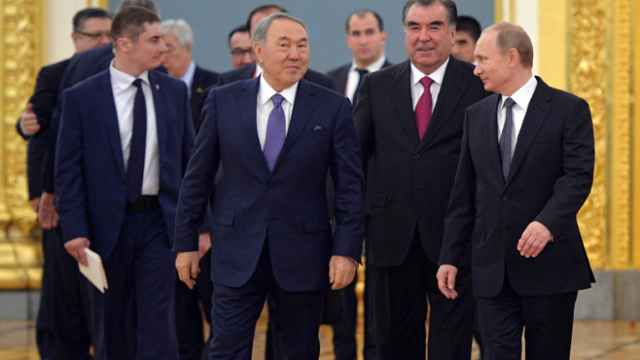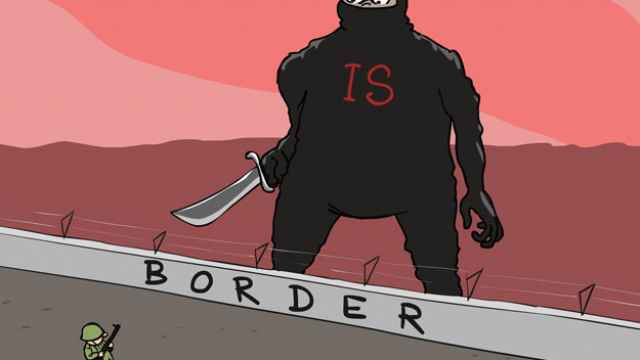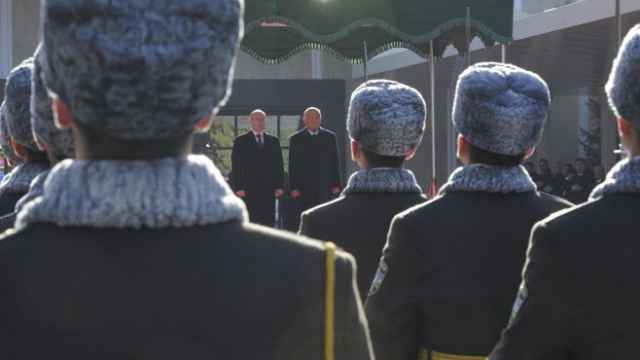OSH, Kyrgyzstan — Authorities in Central Asia's former Soviet "stans" are taking draconian measures to stamp out militant Islam, but their harsh methods and the absence of democratic politics risk provoking a backlash that could bring even greater instability.
While the region's authoritarian rulers have battled Islamic militancy throughout the quarter century since the Soviet Union broke up, the rise of the Islamic State group has brought what security services describe as a new, more dangerous threat.
Uzbekistan has banned beards, outlawed Islamic dress, shut restaurants that refuse to sell alcohol and warned teahouses not to celebrate the nightly end of the Ramadan fast with "Iftar" meals. In Kyrgyzstan, where the authorities vet preachers to ensure mosque sermons do not stir up unrest, there have been shootouts between the secret police and militants.
In Tajikistan, the feared commander of an elite police force declared himself a member of Islamic State this year. Colonel Gulmurod Khalimov appeared in a YouTube video clad in black and carrying a sniper rifle, called the government "dogs" and vowed to bring jihad to Russia and the United States.
Western countries, typically more concerned about security in Central Asia as a supply route to NATO's war in Afghanistan, are now taking note of the new threat in a region of 60 million people that links China, Russia and the Middle East.
The International Crisis Group think tank estimates 4,000 people from the region have joined or assisted Islamic State fighters who have seized swathes of Syria and Iraq.
"I think that everyone needs to be vigilant about ISIS," the U.S. Principal Deputy Assistant Secretary of State for South and Central Asian Affairs, Richard Hoagland, said during a visit to Uzbekistan this month, using an acronym for Islamic State.
"But it is not just ISIS that might cross the border from Afghanistan into Central Asia … it's ISIS that will possibly grow within the countries of Central Asia," he said.
Going Underground
Central Asia emerged from the collapse of the Soviet Union with its endless steppes, blinding deserts, towering mountains and gleaming mediaeval mosques divvied up into five republics. Their zigzagging borders were drawn up by Bolshevik commissars to separate and control the region's main Turkic and Persian ethnic groups.
Most of the republics are still ruled by the Soviet Communist Party nomenklatura, now feted with lavish personality cults and, apart from in Kyrgyzstan, installed as de facto presidents for life. The rulers still gravitate towards Moscow and remain suspicious of religion, reliant on ex-KGB secret police and authoritarian by instinct.
Their people are mostly among the world's poorest and their post-Soviet histories have been marked by ethnic and religious violence and political repression. Uzbekistan and Turkmenistan are two of the most closed and authoritarian societies in the world; Tajikistan spent the 1990s fighting civil war against Islamists, and Kyrgyzstan has seen two revolutions and ethnic unrest.
Of the five, only Kazakhstan, with major international investment in oil and gas, has emerged stable and prosperous, and it too brooks no democratic opposition. One-time provincial Soviet Communist boss Nursultan Nazarbayev, in power since 1989, was re-elected president with nearly 98 percent of the vote this year.
Around half the region's people live in Uzbekistan, a country of irrigated desert cotton farms and scattered Silk Road cities, which restricts travel by its citizens abroad. It has had limited interaction with the outside world since its police opened fire on a crowd of protesters a decade ago, when most Western countries cut back relations with ruler Islam Karimov.
Karimov has long presented himself as a bulwark against Islamist radicals and has been leading a secularizing campaign in recent years, banning traditional headscarves for women and beards and skullcaps for men.
But rights groups say his heavy hand has exacerbated the radical Islamist threat by treating all dissent alike, pushing mainstream opponents underground and into the arms of radicals.
New York-based Human Rights Watch says the government has tortured and imprisoned thousands of independent Muslims on politically motivated charges of "extremism" for exercising religious freedom without adhering to strict state controls.
Wide-ranging restrictions cover anything from possession of an "unauthorized" Koran, to discussion of religious topics outside a registered mosque.
"Not only does Tashkent's current policy egregiously violate fundamental rights, it also pushes individuals underground, and those already in prison to embrace organizations banned by the state," HRW Central Asia researcher Steve Swerdlow told Reuters.
Restaurants in the capital Tashkent have dropped halal food from their menus and those which refuse to serve alcohol risk closure. Charities that served Iftar meals were warned off during Ramadan last month.
"I think they banned Iftar at cafes because they think it is some sort of religious gathering," said Akbar, a 35-year-old college teacher, who, like most Uzbek citizens, would not risk giving his full name when speaking to a journalist.
"Any unsanctioned religious gathering is seen as suspicious, sometimes even dangerous."
'Our Islam Is the Correct One'
Next door is arguably the region's most open country, Kyrgyzstan, where public revolts unseated unpopular presidents in 2005 and 2010, and executive power is now shared between an elected president and a prime minister named by parliament. But it too has seen a clampdown on unauthorized preaching.
Forces from the local KGB successor, the GKNB security police, clashed with two groups of suspected Islamic State fighters in the capital Bishkek this month, killing six militants and capturing another seven.
Police said the militants were preparing attacks in Bishkek's main square and at a Russian air base.
Kyrgyz authorities say 350 people have travelled from the country to join Islamic State. Most came from Osh and Jalal Abad, Kyrgyz-controlled parts of the Ferghana valley, a fertile mountain region divided by looping frontiers between Kyrgyzstan, Uzbekistan and Tajikistan.
Violence has been endemic across Ferghana, flaring most recently in 2010 when hundreds died in clashes between ethnic Uzbeks and Kyrgyz in Osh. But the authorities say it is now under control thanks to strict measures to rein in preachers.
Security police in Osh arrested 39 people last year and another eight in January accused of being members of extremist groups, said Colonel Asylbek Kozhobekov, the Osh region's GKNB chief.
"Do you know, why there have been no terrorist acts here? Because our Islam is the correct one," he told Reuters. "God forbid, some preachers come here to explain that according to the Koran jihad is needed. We have to prevent this scourge."
To illustrate the threat, Kozhobekov allowed Reuters to interview a jailed militant at the security police headquarters, 27-year-old Boburjan, an ethnic Uzbek from Kyrgystan who has confessed to training in Syria for three months before returning to Central Asia to carry out attacks.
Boburjan told Reuters he had been recruited in Moscow where he had travelled to seek work. Although he had only limited knowledge of the Koran, he was approached at a mosque and won over by videos and stories of holy war. He was detained on his return and sentenced to six years in jail.
To prevent militant preaching at local mosques, the authorities conduct appraisals of the clergy, Kozhobekov said.
Critics say such monitoring sometimes turns into repression of popular imams. In the most recent case, Rashod Kamolov, who preached at a mosque in the town of Karasu near the Uzbek border, was detained and is now awaiting trial, charged with recruiting radicals and forming illegal groups.
"We must always think what kind of reaction may follow if religious people are persecuted and jailed, if imams of local mosques who never preached anything forbidden are labelled in various ways," said Sadikjan Kamaluddin, himself a Karasu imam.
Rose Petals
To the south in Tajikistan, former Soviet Communist Party apparatchik Emomali Rakhmon allied himself firmly with Russia to defeat Islamist militants in a civil war in the 1990s.
Midway through his third decade in power, he now enjoys the lavish personality cult typical of the region. He is met by jubilant crowds on his travels across one of the world's poorest countries, his way at times strewn with rose petals. Choirs perform songs likening him to the Prophet Mohammad, unnerving some local Muslims.
But the apparent defection this year of his elite police chief to Islamic State proved that all is not as stable as it appears. Alexander Knyazev, a Central Asia analyst based in relatively open Kazakhstan, said that by brooking no dissent, Rakhmon was recreating some of the conditions that brought about the civil war two decades ago.
Putting pressure on the opposition Islamic Renaissance Party of Tajikistan, which includes some of his wartime foes, could drive more people towards radical Islam.
"A possible closure of this party … would give a powerful impetus to a growing number of illegal groups and movements exploiting militant Islam," he said.
A Message from The Moscow Times:
Dear readers,
We are facing unprecedented challenges. Russia's Prosecutor General's Office has designated The Moscow Times as an "undesirable" organization, criminalizing our work and putting our staff at risk of prosecution. This follows our earlier unjust labeling as a "foreign agent."
These actions are direct attempts to silence independent journalism in Russia. The authorities claim our work "discredits the decisions of the Russian leadership." We see things differently: we strive to provide accurate, unbiased reporting on Russia.
We, the journalists of The Moscow Times, refuse to be silenced. But to continue our work, we need your help.
Your support, no matter how small, makes a world of difference. If you can, please support us monthly starting from just $2. It's quick to set up, and every contribution makes a significant impact.
By supporting The Moscow Times, you're defending open, independent journalism in the face of repression. Thank you for standing with us.
Remind me later.






